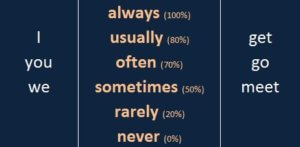What are Adverbs of Frequency?
An adverb of frequency describes how often an action happens. There are six main adverbs of frequency that we use in English: always, usually (or normally), often, sometimes, rarely, and never.
- How do you usually introduce or elicit these from your students? Which ones do you find your students usually struggle with?
- A good way to explain the difference in frequency is by using % as you can see in the picture below.
They differ in the level of frequency, as you can see below.

We can also use ‘seldom’ as an alternative to ‘rarely’, but it is not very common in modern English.
How to teach Adverbs of Frequency
I find it useful to show students the table above, so that they can see the most common position for adverbs of frequency is between the subject and the verb. Here are some other examples I tend to use with them:
- Sara always goes out on Saturday evenings.
- Jane’s boyfriend usually picks her up and they drive into the city centre.
- Ben and Emma often go for lunch together.
- In the winter Sara sometimes goes Skiing in France.
- James and Stephen rarely go to the cinema in the summer because they prefer to stay outside.
- As Marta is so busy she never gets home from work before 7
Are there any example sentences you use which you feel help students to grasp the meaning better than the above ones?
Once students have understood this we then have to introduce them to the exception to this rule- the verb ‘to be’. With sentences using the verb ‘to be’, the adverb of frequency comes after the verb. For example:
- There are always lots of people in the city centre on Saturday nights.
- It’s often difficult to find a place to park.
- But our friends are never on time so it doesn’t matter if we’re late.
As is often the case in English, there are variations to this rule. For example, it’s possible to put the adverbs ‘sometimes’ and ‘usually’ at the beginning of a sentence:
- Sometimes she does her homework with friends.
- Usually they study on their own.
It’s easier to encourage students to follow the rule of putting all adverbs of frequency between the subject and verb. Just remember to remind them the verb ‘to be’ is different and put the adverb after it.
How do you usually concept check this as sometimes it can be confusing!?
The Question Form
To make questions about frequency, we normally use ‘How often…?’. For example:
- How often do you watch films?
- How often does he play tennis?
- How often do the trains arrive late?
But it’s also possible to ask questions simply with an adverb of frequency. For example:
- Do you often come here?
- Does she always work so hard?
- Do they ever pay on time? (‘ever’ instead of ‘never’ for questions)
- Video






